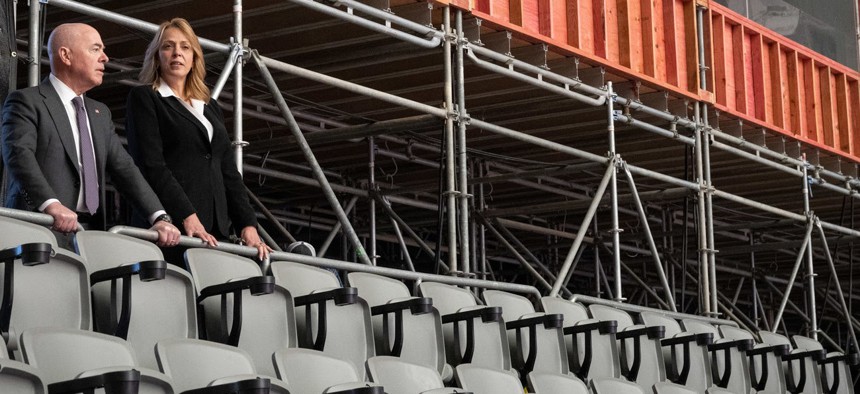
Homeland Security Secretary Alejandro N. Mayorkas visited Arizona this week ahead of Super Bowl LVII. Courtesy of the Homeland Security Department
Federal Officials’ Plans for the Super Bowl Have Reached the End Zone
More than 600 Homeland Security personnel are providing support for this year's game.
Before there can be any downs, flags or time outs, the Homeland Security Department has their own game day preparations for the Super Bowl.
On Sunday, the Philadelphia Eagles will face the Kansas City Chiefs in the 57th Super Bowl at State Farm Stadium in Glendale, Ariz., with a half-time show starring Rihanna. As is customary, DHS is working to ensure safety and security at the game on a variety of fronts.
“DHS is a department of partnerships, and our efforts here rely on our partnerships with federal, state, local, tribal, and campus agencies, and of course, the [National Football League],” Homeland Security Secretary Alejandro Mayorkas said in a statement on Tuesday. “Dedicated DHS personnel are on the ground preparing and coordinating and stand ready to provide operational and technical support to the NFL, State of Arizona, and the cities of Glendale and Phoenix to keep Super Bowl LVII safe and ensure everyone can enjoy the game.”
Earlier this week, Mayorkas traveled to Phoenix to meet with state and local law enforcement officials as well as NFL representatives to go over the department’s plans and participate in a press conference. “DHS’s support for Super Bowl LVII includes more than 600 personnel providing extensive air security resources; venue, cyber, and infrastructure security assessments; chemical, biological, radiological, nuclear, and explosives detection technologies; intelligence analysis and threat assessments; intellectual property enforcement; and real-time situational awareness reporting for our partners,” said a press release from DHS.
Scott Brown, special agent in charge for Homeland Security Investigations in Arizona, is the federal coordinator for this year’s Super Bowl. He explained to Government Executive that his job includes coordinating with local departments that are leads for events to identify “the resource gaps they have in their planning, be that people, be that technology, be that K-9’s.” If they can’t meet the needs locally, Brown added, “it’s my job to go out into the federal interagency and see if I can find that resource and make it available to them.”
The PGA Tour’s WM Phoenix Open is also happening that weekend, which “is certainly a huge draw on all of the agencies’ resources in terms of the public safety mission,” Brown said. “So, it really just is making sure that we are both federally and state, local, county, tribal [partners] shifting resources to where the needs are.”
Drugs are another issue on the radar of law enforcement.
“We're dealing with unprecedented flows of fentanyl coming into the country. Arizona is the leading area where fentanyl is entering the country,” said Brown in a statement provided by Immigrations and Customs Enforcement, which houses HSI. “That's a mission that we must make sure we're not impeding, while we're also covering down the requirements to provide a safe Super Bowl.”
John Modlin, chief patrol agent for the Tucson border patrol sector who is the lead field coordinator for this Super Bowl for Customs and Border Protection, said that agency has been planning for security operations for about the last year,, which has included meetings with local and state law enforcement agencies, the NFL and other stakeholders.
About 150 CBP agents are working on Super Bowl related matters, according to Modlin. CBP has “multiple missions” at, before and during Super Bowl, he said, including using non-intrusive inspection technology to scan vehicles coming into the stadium area; enforcing the air space around the Super Bowl; looking for violations of intellectual property rights and working to combat human trafficking.
As for counterfeit goods, Operation Team Player is a year-round initiative by DHS’s components and all major U.S. sport leagues. Since last February, the operation has seized more than 180,000 counterfeit items for all major sports worth nearly $23 million.
“As the Super Bowl is in different places, of course a place like Arizona where CBP and DHS have a pretty significant footprint in terms of personnel and technology and assets it actually is beneficial because the people that will be working the Super Bowl are also local people that are very in touch with and have great relationships with these other law enforcement agencies,” Modlin said. “It’s always a little more difficult to come into an area and have to establish those relationships and build trust very fast.”
Among the many fans at State Farm Stadium will be First Lady Jill Biden, a major Eagles fan. Government Executive asked the Secret Service about their security preparations for the game, but they declined to comment due to the need to protect operational security.
Other agencies involved in safety operations are the Center for Countering Weapons of Mass Destruction Office, Cyber Security and Infrastructure Security Agency, Federal Emergency Management Agency, Federal Protective Service, Transportation Security Administration, and U.S. Coast Guard. The Super Bowl is considered a National Special Security Event, which is a designation for events of national or international significance that have a potential for terrorism or criminal activity.
Kickoff has yet to occur for this year’s game, but DHS is already working on preparations for next year's Super Bowl in Las Vegas.







